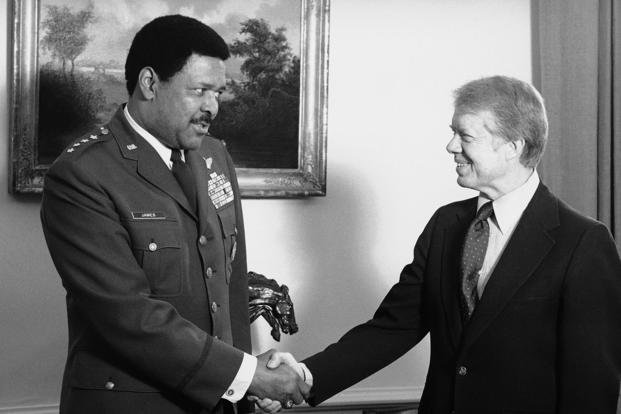After he pinned on his fourth star, Air Force Gen. Daniel "Chappie" James Jr. summed up his thoughts on his years of military service: "I've fought in three wars, and three more wouldn't be too many to defend my country. I love America, and as she has weaknesses or ills, I'll hold her hand."
The first Black service member to reach the rank of full general, James -- at the time of his promotion in 1975 -- also was appointed commander of the North American Air Defense Command (NORAD), with responsibility for all aspects of air defense for the United States and Canada.
James was born in Pensacola, Florida, on Feb. 11, 1920. He attended Tuskegee Institute and was one of the famed "Tuskegee Airmen." The unit was part of the government-sponsored Civilian Pilot Training Program, an all-Black unit whose members were kept separated from their White counterparts. For more information on the Tuskegee Airmen, see this special feature.
In an era of enforced segregation in the armed forces, James continued to achieve despite racial bias. He fought in the Korean and Vietnam wars, flying more than 160 combat missions and leading the Operation Bolo MiG sweep of 21 Communist aircraft -- the highest total kill of any Vietnam air mission.
James had spent years gaining combat experience at Air Force bases at home and overseas. When he returned to the United States after his Vietnam assignment, he took command of the 7272nd Fighter Training Wing in the Libyan Arab Republic in 1969. Afterward, however, James moved briefly into public affairs, and it was in his role as principal deputy assistant secretary of defense (public affairs) that he gave his most public contributions in service. As an effective and thoroughly professional Air Force spokesman, he spoke out not only on military policies, but also on racial policies.
No matter how outspoken James was in favor of desegregation, what most people recall from his speeches is his deep patriotism and commitment to duty. Among his numerous awards is the 1970 Arnold Air Society Eugene M. Zuckert Award for outstanding contributions to Air Force professionalism. The citation for the honor says it all, proclaiming James a "fighter pilot with a magnificent record, public speaker, and eloquent spokesman for the American Dream we so rarely achieve."
Want to Know More About the Military?
Be sure to get the latest news about the U.S. military, as well as critical info about how to join and all the benefits of service. Subscribe to Military.com and receive customized updates delivered straight to your inbox.














